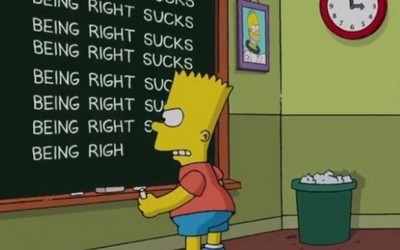
Pet Peeves #2 Being Computer-Pilled
[This post contains 3 inaccuracies, 5 mistakes, and 1 blunder. But you won't notice any of them]Never analyze your game with a computer. All my friends, loved ones, and students analyze their games with a computer. As do I. How could you not? Stockfish is right there, open-source and free for anyone to use. And on this website, they don't even charge you to use it.
Such is the paradox of chess improvement in the computer era. Limiting yourself to only focusing on the mistakes in your game that you yourself can recognize is doing yourself a great disservice, stunting your growth as a player. But taking the computer's criticism at face value can lead to a host of other problems that can stunt your growth as a player. I can think of at least five ways, which I will try to illustrate below:
1 When the 'best' or 'only' move requires a specific continuation to understand why it is best
2 When similarly scored positions vary greatly in terms of intuitiveness
3 When a 'bad' move requires a specific continuation to recognize that it is bad
4 When similarly scored moves vary widely in terms of forcing quality
5 When similarly scored moves vary widely in terms of playability
1 "I missed the best move!"
Did you really miss the best move? Or did you miss a very difficult-to-spot subtlety several moves down the line? Here's a game I played with my friend Dan, (@bishoppair on twitter) from today
The point here is that it is VERY easy to glance at the computer and say "yeah, I should have played 16...d4. That was my plan and I psyched myself out of it. That was the only move that kept an advantage" But my judgment that d4 didn't work was CORRECT based on any reasoning that involved taking on h6 after Nh5. Actually, based on any reasoning that didn't involve finding 19...Rd6. If anything, my understanding that white had sufficient compensation (at least!) for the material after 16...d4 was completely correct. But according to the engine, 16...Bc5?? was a blunder not because white has a +1.1 advantage, but because of the 4.2-point swing between the computer's line after 16...d4 and my move. But, again, after anything but the computer's precise line, the difference between the two moves is closer to 1 (at most) than 4. Actually, the "(at most)" is doing a lot of work here, which brings me to....
2 "I could have kept the balance if I didn't play that move"
Could you have? Or could only Stockfish have? Going back to the same game, with the variation I had considered involving taking on h6. Look at the three moves that are scored as 0.0 after 20. f6
One involves a perpetual check (apparently) and others involve hanging on by a thread with an incredibly vulnerable king. Apparently, none of these are as bad as the +1.1 position for white I found myself in after my 16th move. But all oscillate between 0 and 1, and all involve a far more vulnerable king than I got in the game. So not only was my move not a 4-point-swing compared to the most obvious continuation starting with d4, but I'm not even convinced it was a 1-point-swing, considering the resulting positions that the computer insists are perfectly playable.
3 "I was losing after this move"
Were you? Or, again, were you losing after one hard-to-anticipate continuation?
Not to sound like a broken record but I want to distinguish between positions where the computer chastises us for throwing away the win and positions where the computer chastises us for getting into a worse position. Here's a game from a friend of mine, whose name and identifying features I will not include for HIPPA reasons.
In order to see that 13...f6 was not better for black, and thus to look for improvements, and thus to identify Qc5 AS an improvement (even though it's better for white!), would require finding 15 Rae1. Without this information, there is no reason to think black is not perfectly fine after 13...f6, nor to think that the mess after 13...Qc5 is in any sense preferable to 13...f6.
4 "I didn't annotate this move because the computer said my move was the same as a bunch of other choices"
Mazel tov, this move wasn't a blunder, or even an inaccuracy. Does that mean you shouldn't dwell on it? Mabes! But mabes not! Here's a moment where I was very much winning in a game, and had many, many ways to preserve a significant advantage
In this example, it's not that the computer was wrong. It's just that, when all the choices are 4, 5, or 6 points in your favor, it's hard to understand how much that difference matters practically. It would be easy to fixate entirely on the unforced error I made on move 26, not the seemingly minor choice of how to keep a winning edge on move 18. But the sort of counterplay white needed only existed because I did not take their best piece off the board on move 18. The computer has no way of articulating this.
5. "This looks drawish"
No examples for this one. Just look at any game Magnus Carlsen won in like 2014. Read Kotronias's new book 'how to play equal positions'. The point is simply that an 'equal' evaluation simply means that any problem one side can pose appear to have an answer from the other side. But how difficult are the problems? How frequent are they? How concrete are they? If one side is the only side that can be asking questions, and if these questions can keep up for many moves, that can practically speaking be a more valuable initiative than many concrete plusses, especially those where the 'plus' has to do with some of hte reasons outlined above.
IN CONCLUSION: The computer is a great tool for telling you, with perfect information (or close to it), what *should* happen. And we should all strive to play our best possible games. But the problem, and one exacerbated by the flashy ACPL stats or 'you made x blunders" or "this was a brilliant move" sorts of bells and whistles, is that we often are tempted to beat ourselves up for (or occasionally praise ourselves) for things that go way beneath the surface.
My suggestion is to really prioritize going over your games by yourself first, then with an engine, and then with somebody better than you, like a coach or friend. This way, you can get a sense of how 'easy' or 'obvious' various computer suggestions were:
-Did you spot them yourself post-game without an engine?
-Did every move in the computer line make total sense and seem obvious?
-Did your coach/friend say they saw it without a computer?
This information matters before you start beating yourself up for missing something. Because of course, after you look at it immediately with an engine, the full variation will appear obvious to you. And of course the perfectionist in us will want to think we could have gotten there. But that's just not a very practical approach to take!
Additionally, when I do use an engine, I try to think of the questions I want to ask it. I focus on pawn pushes and piece trades, as well as dynamics like how open or closed the board is or which pieces are the most active. Then I look for moves that change any of those features, and see if the evaluation swings wildly. If so, that's a clue that something that definitely matters to me was relevant. If I trade off my 'bad bishop' and suddenly go from better to worse in all variations, that's a suggestion I misevaluated the value of my bishop. That's good information! Here's an example
In this game, it NEVER occurred to me that I could re-route my king to g8 as to open up the center. But I was aware that had white played better, their queenside pressure would be very hard to meet, considering that I shouldn't open the center with my king on e7. So when I saw that the computer loved 18...Kf8 with the plan of Kg8 and d5 to follow, it was very eye-opening because it was solving a problem I had already named (how to respond to queenside expansion) in a way that I hadn't thought of (re-route king as to open the center). This was a great point/plan that I hadn't considered, and gave me lots to think about. But I understood that the reason why my moves were bad was because they didn't answer my question of how to handle the queenside expansion, and that the reason the computer thought Kf8 was better was because it provided an answer to that question.
Which is to say: start your engines. Just, figure out what you're looking for, first.

